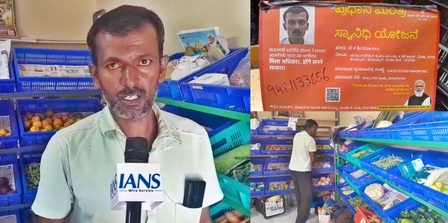
Tumkur, April 9 (IANS) Beneficiaries of the Central government’s Pradhan Mantri Street Vendor’s AtmaNirbhar Nidhi (PM SVANidhi) Scheme in Karnataka’s Tumkur district are experiencing an improved quality of life, thanks to the support provided by the scheme.
Srinivas, a vegetable vendor in the district, shared his journey with IANS, explaining how the scheme has transformed his business and financial situation.
He initially applied for a loan under the PM SVANidhi Scheme and received Rs 10,000. Using the profits from his vegetable business, he repaid the loan in monthly installments. He was then granted a second loan of Rs 20,000, which helped him expand his business further. More recently, he was approved for a third loan of Rs 50,000, which has significantly improved his business operations.
“At present, my business has significantly improved,” he said.
Before receiving financial assistance through the PM SVANidhi Scheme, Srinivas had to rely on local lenders who charged high interest rates. He noted that his life changed for the better once the government began supporting his business.
Srinivas recalled that officials from the municipality had initially visited and verified his documents before disbursing the funds under the PM SVANidhi Scheme. As part of the scheme’s requirements, he was instructed to display a signboard in front of his vegetable shop, which he has duly complied with.
The PM SVANidhi Scheme, launched by the Ministry of Housing and Urban Affairs in June 2020, is a micro-credit initiative designed to help street vendors. It provides collateral-free loans with flexible repayment terms, making it easier for small traders to access financial support.
The scheme is structured in three loan cycles: Rs 10,000 for the first cycle, Rs 20,000 for the second, and Rs 50,000 for the third. Repayment terms are flexible, and interest subsidies are available until March 2028. The government aims to extend benefits to around 50 lakh vendors across the country.
To be eligible for the scheme, street vendors must have been working in urban areas on or before March 24, 2020, selling items such as fruits, vegetables, and ready-to-eat street food, or providing services like barbershops and laundry. Even vendors without a certificate of vending are eligible to apply and can obtain a provisional certificate after a local enquiry.
–IANS
jk/vd



